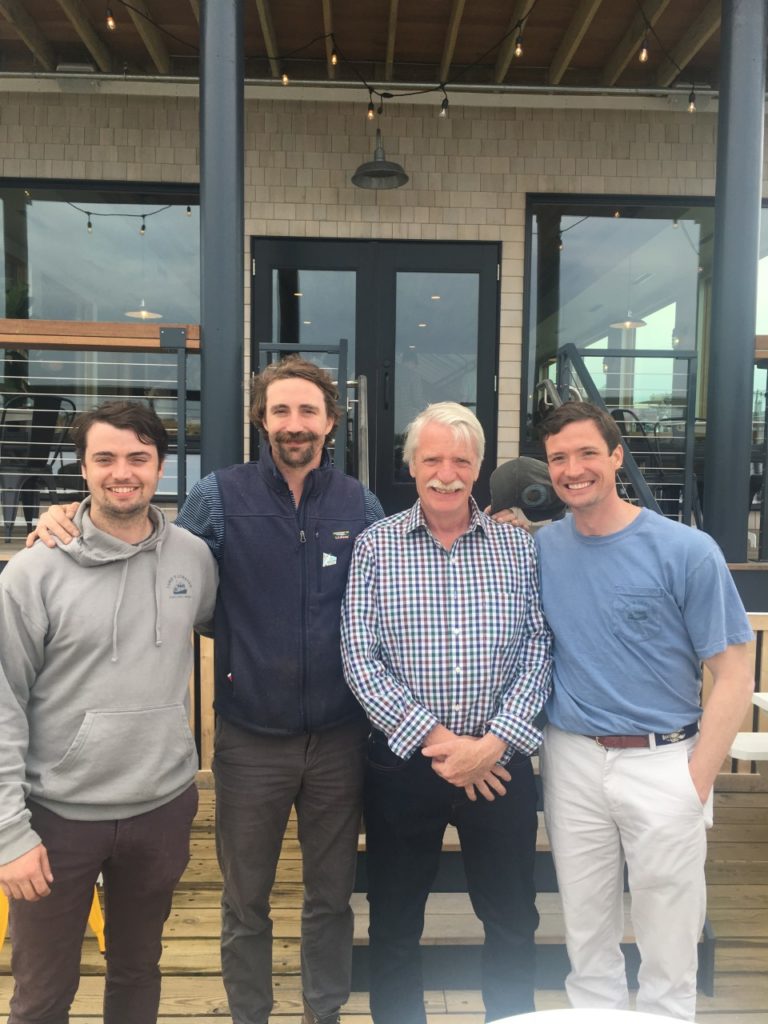The Art of Paddling Like Hell
The founder and CEO of Luke's Lobster ponders some of his father's advice as he works to keep his business afloat amidst a pandemic

The breakneck pace of my life, and particularly these last several months, have left little time for reflection. Yet, as a new(ish) father, this month’s Father’s Day now has more meaning—not because of the adoration I got from Poppy (age 2) and my daughter Banks (not yet 1), but because being a dad has given me a new appreciation for my own father. Now, what I realize was impossible to understand before becoming a father myself, is how good my father was at being like a duck. This realization came to me in early May during some of my most challenging times when I was trying to keep Luke’s afloat during the pandemic. Those were dark days, when it seemed everything hung by a thread, with all but one of our shacks closed down. During that time, I met (remotely, of course) with my team three times a week, and often kicked off each meeting with a quote that seemed particularly apropos. It was something along the lines of, “Be like a duck—keep calm and unruffled on the surface, but paddle like hell underneath.”
Throughout my youth, this was my father: calm (mostly) and unruffled, but always paddling like hell. When he was a boy, he cut his teeth working on Portland’s waterfront in the 1960s, in all its gritty glamor. At the time lobsters were just a small part of Maine’s fishing industry. It was mostly groundfish and what we now call baitfish: whiting and herring, and in those days it was all canned. Dad’s first job was unloading whiting from inshore fishing vessels. He started at 6 p.m. and worked almost through the night, moving whiting from holds into baskets. The baskets, brimming with the small silvery fish, were then hoisted ashore and taken to the processing plants, which ran 24 hours a day, 7 days a week, all summer long. Later, Dad worked as a sternman and hauled his own traps. The price of lobster was about $1.00 or $1.25 a pound at the time. He started catching crab, too, but there was no market for crab. What I have come to understand is my father’s style: he literally went and created a market for crab. He found a storefront on Munjoy Hill (rented for $50 a month), opened up a store, put in a lobster tank and a fish counter, and started selling the lobsters and crabs he caught. He hired a few crab pickers, and business went so well that he sold his boat and dedicated himself to processing. He had the first lobster and crab processing license ever issued by the state of Maine.
In part, Luke’s Lobster began the way my father’s first shop on Munjoy Hill began. Dad was processing lobster in 2007 when the economy started to tank. He was able to keep a strong market for lobster tails, which were going to the military overseas as part of an ‘appreciation for your service’ surf-and-turf dinner for the servicemen and women, but knuckle and claw meat weren’t moving. About that same time, I was working in New York as an investment banker and feeling just a little homesick. He called me up and said, “The industry’s really going to hurt if we can’t find a home for knuckle and claw meat,” and we wondered if we could build a bigger demand for lobster rolls in New York. I went out on a lobster roll–tasting mission and found them all to be overpriced and underwhelming. From the overabundance of knuckle and claw meat came a solution in the form of Luke’s Lobster.
Of course, if you know anything about the processing business, you know that not one single thing about it is easy. You’re always paddling like mad, and chances are, your mind is going round the clock too. As I got older, I came to understand that my Dad did a lot of paddling, but each night when he walked through the door, he was unruffled, even if he came in sporting eau de lobster. What Luke’s recently went through with the pandemic, combined with my new(ish) role as husband and father, made me appreciate how hard my own father paddled all the more. And although the paddling is hard, staying calm and unruffled for your children is much, much harder. It’s an art and a strength my father has mastered; I am a work in progress.
So with our shacks slowly and carefully opening back up, I’m going to do for my father what he so often did for us: bring home a bunch of lobsters, steam them up, share a meal, and possibly stop paddling for an evening.



